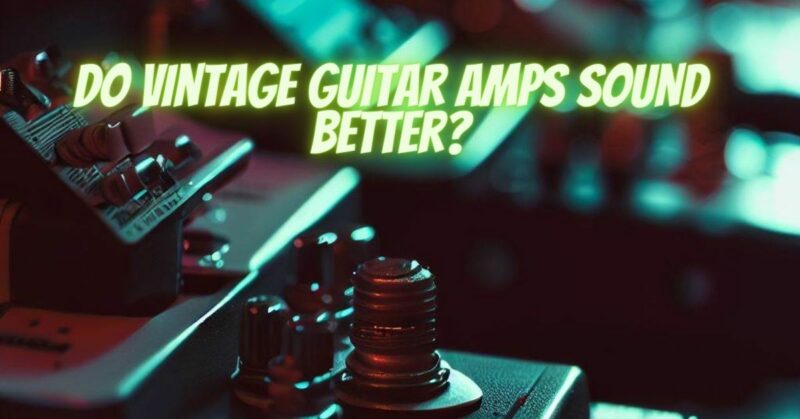The debate between vintage guitar amps and modern counterparts has long been a subject of discussion among musicians. Vintage amps, typically those produced before the 1980s, hold a special place in the hearts of many players, often regarded for their unique tonal characteristics and nostalgic appeal. In this article, we will explore the reasons behind the allure of vintage guitar amps, discuss their potential advantages, and address whether they indeed sound better compared to modern amplifiers.
The Appeal of Vintage Guitar Amps:
- Unique Tonal Characteristics: Vintage guitar amps are celebrated for their distinct and characterful sound. They often produce warm, rich tones with a touch of harmonic complexity that many musicians find appealing. These vintage tonal qualities have been featured on countless classic recordings and have contributed to shaping the sound of various musical genres.
- Nostalgic Value: Vintage guitar amps evoke a sense of nostalgia, connecting players to the rich history of music. Owning and playing a vintage amp can be a reminder of the iconic musicians who have used similar equipment in the past, adding a sense of tradition and authenticity to one’s playing.
- Build Quality: Many vintage amps were built with meticulous craftsmanship and high-quality components, contributing to their longevity and reliability. Some players believe that older amps were made with superior materials, which may result in a more enduring product.
Advantages of Vintage Guitar Amps:
- Vintage Circuit Designs: Vintage guitar amps often feature circuit designs that have become iconic for their sound. These circuits may have specific quirks, such as unique overdrive characteristics or natural compression, that are challenging to replicate in modern amps.
- Tube Technology: Many vintage guitar amps use vacuum tubes (valves) for amplification, and these tubes are known for their warm and responsive sound. Some players believe that vintage tube technology delivers a more organic and dynamic tone compared to solid-state amplifiers.
- Vintage Speaker Design: Vintage amps may use specific speaker models that contribute to their unique sound. These speakers, designed decades ago, may have characteristics that differ from modern speaker designs, adding to the vintage amp’s overall tonal profile.
Addressing the “Better” Sound:
While vintage guitar amps possess undeniable charm and unique tonal qualities, it is essential to note that the perception of “better” sound is subjective and varies among players. Modern guitar amplifiers have significantly improved over the years, with advancements in circuitry, modeling technology, and speaker design.
Modern amps often provide players with a wider range of tones, built-in effects, and features that enhance versatility and adaptability to different playing styles. Additionally, modern amps may offer improved reliability, weight reduction, and other practical benefits.
Ultimately, whether a vintage guitar amp sounds “better” depends on individual preferences, playing style, and the desired tone. Some players seek the warm and nostalgic sound of vintage amps, while others prefer the convenience and modern features offered by contemporary amplifiers.
Vintage guitar amps hold a special place in the hearts of musicians due to their unique tonal characteristics, nostalgic appeal, and craftsmanship. They have contributed significantly to the history of music and continue to be sought after by collectors and enthusiasts.
While vintage guitar amps offer distinct qualities that many players adore, whether they sound “better” than modern amps is a matter of personal preference. Modern guitar amplifiers have made significant advancements in tone, features, and reliability, providing players with a vast array of options to suit their individual musical needs.
Ultimately, the choice between vintage and modern guitar amps comes down to the player’s desired sound, playing style, and the specific characteristics that resonate with them the most. Both vintage and modern amps have their unique allure and contribute to the diverse and rich world of guitar amplification.


